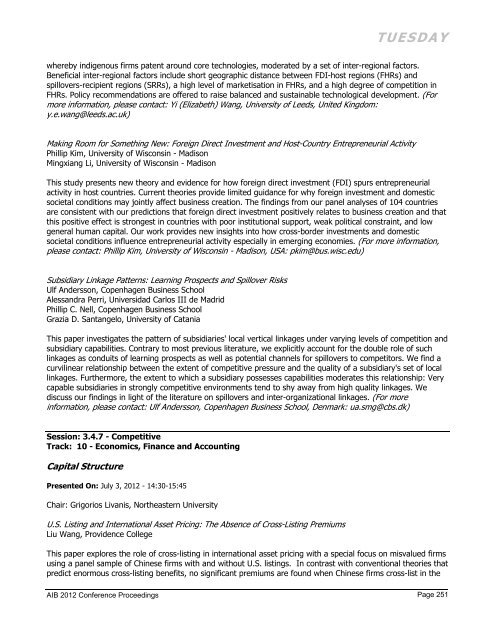AIB 2012 Conference Proceedings - Academy of International ...
AIB 2012 Conference Proceedings - Academy of International ...
AIB 2012 Conference Proceedings - Academy of International ...
You also want an ePaper? Increase the reach of your titles
YUMPU automatically turns print PDFs into web optimized ePapers that Google loves.
TUESDAY<br />
whereby indigenous firms patent around core technologies, moderated by a set <strong>of</strong> inter-regional factors.<br />
Beneficial inter-regional factors include short geographic distance between FDI-host regions (FHRs) and<br />
spillovers-recipient regions (SRRs), a high level <strong>of</strong> marketisation in FHRs, and a high degree <strong>of</strong> competition in<br />
FHRs. Policy recommendations are <strong>of</strong>fered to raise balanced and sustainable technological development. (For<br />
more information, please contact: Yi (Elizabeth) Wang, University <strong>of</strong> Leeds, United Kingdom:<br />
y.e.wang@leeds.ac.uk)<br />
Making Room for Something New: Foreign Direct Investment and Host-Country Entrepreneurial Activity<br />
Phillip Kim, University <strong>of</strong> Wisconsin - Madison<br />
Mingxiang Li, University <strong>of</strong> Wisconsin - Madison<br />
This study presents new theory and evidence for how foreign direct investment (FDI) spurs entrepreneurial<br />
activity in host countries. Current theories provide limited guidance for why foreign investment and domestic<br />
societal conditions may jointly affect business creation. The findings from our panel analyses <strong>of</strong> 104 countries<br />
are consistent with our predictions that foreign direct investment positively relates to business creation and that<br />
this positive effect is strongest in countries with poor institutional support, weak political constraint, and low<br />
general human capital. Our work provides new insights into how cross-border investments and domestic<br />
societal conditions influence entrepreneurial activity especially in emerging economies. (For more information,<br />
please contact: Phillip Kim, University <strong>of</strong> Wisconsin - Madison, USA: pkim@bus.wisc.edu)<br />
Subsidiary Linkage Patterns: Learning Prospects and Spillover Risks<br />
Ulf Andersson, Copenhagen Business School<br />
Alessandra Perri, Universidad Carlos III de Madrid<br />
Phillip C. Nell, Copenhagen Business School<br />
Grazia D. Santangelo, University <strong>of</strong> Catania<br />
This paper investigates the pattern <strong>of</strong> subsidiaries' local vertical linkages under varying levels <strong>of</strong> competition and<br />
subsidiary capabilities. Contrary to most previous literature, we explicitly account for the double role <strong>of</strong> such<br />
linkages as conduits <strong>of</strong> learning prospects as well as potential channels for spillovers to competitors. We find a<br />
curvilinear relationship between the extent <strong>of</strong> competitive pressure and the quality <strong>of</strong> a subsidiary's set <strong>of</strong> local<br />
linkages. Furthermore, the extent to which a subsidiary possesses capabilities moderates this relationship: Very<br />
capable subsidiaries in strongly competitive environments tend to shy away from high quality linkages. We<br />
discuss our findings in light <strong>of</strong> the literature on spillovers and inter-organizational linkages. (For more<br />
information, please contact: Ulf Andersson, Copenhagen Business School, Denmark: ua.smg@cbs.dk)<br />
Session: 3.4.7 - Competitive<br />
Track: 10 - Economics, Finance and Accounting<br />
Capital Structure<br />
Presented On: July 3, <strong>2012</strong> - 14:30-15:45<br />
Chair: Grigorios Livanis, Northeastern University<br />
U.S. Listing and <strong>International</strong> Asset Pricing: The Absence <strong>of</strong> Cross-Listing Premiums<br />
Liu Wang, Providence College<br />
This paper explores the role <strong>of</strong> cross-listing in international asset pricing with a special focus on misvalued firms<br />
using a panel sample <strong>of</strong> Chinese firms with and without U.S. listings. In contrast with conventional theories that<br />
predict enormous cross-listing benefits, no significant premiums are found when Chinese firms cross-list in the<br />
<strong>AIB</strong> <strong>2012</strong> <strong>Conference</strong> <strong>Proceedings</strong><br />
Page 251

















